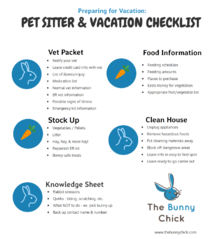Going on a trip
As with any other pet, going out on a trip while owning rabbits can be a complicated task. In general, rabbits should not be left alone longer than 24 hours at a time in case GI stasis or other serious health issues occur while you are away.
Should I take my rabbit with me on an extended trip?
This will mostly depend on the length of your trip as well as the distance.
For short-term trips no more than a few days, it would be best to leave the bunny at home in a familiar environment to decrease the chance of stasis from travel stress.
For longer trips, bringing your rabbit with you can be considered if the drive is not long (less than 8 hours), the trip area has rabbit-savvy veterinarians if needed, and the housing will not change throughout the stay. If you are staying with relatives or friends, make sure that they are not allergic to your rabbit or their hay. Bringing your rabbits on flights can also be an option if the trip will be months long. See the Travel article for more tips on travelling with rabbits.
Otherwise, finding a rabbit-savvy pet sitter or boarding your rabbit will generally be the safer choice.
Extra resources
- BunnyProof.com. Taking your rabbit on holiday with you
Should I board my rabbit or find a pet sitter?
Most rabbits will do best with a rabbit-experienced pet sitter visiting at least once a day with a remote camera monitoring them the rest of the day as rabbits can be easily stressed by environment changes. However, boarding your rabbit with an experienced professional may also be appropriate.
Pet sitting benefits:
- Rabbit is familiar with environment.
- No need to transport your rabbit and their supplies to and from boarding location.
- Can be more cost effective with a large number of pets.
- Free-roam rabbits or rabbits with large exercise areas will not be space-limited in a boarding facility.
Boarding benefits:
- More daily human attention to rabbits.
- Boarding facility will more quickly notice any issues with rabbits and be able to provide prompt medical attention, especially if boarded at a veterinary facility.
- May provide more space to exercise if rabbit will otherwise be caged all day at home.
Extra resources
- House Rabbit Society. Bunny Sitting/Boarding at the Vet
How can I monitor my rabbits remotely?
Remote infrared cameras with history are very common these days, and they are an easy way to watch your rabbit to make sure they're eating and hopping around while you are out of the house, whether during business hours or a more long-distance leisure or work trip.
Some considerations when choosing a camera to set up and purchase:
- Viewing angle: How much environment can the camera see in one position? Does the camera pan and tilt with controls?
- Night vision: Can it automatically change filters to use infrared lighting at night?
- Internet connection: Does it need ethernet or does it use wireless?
- Power connection: Is the camera battery-powered or does it need a cord?
- History storage: Can the camera store footage history? Is this on a SD card or is it in the cloud with the manufacturer? Can you set up your own server?
- App: Does the camera require you to install a separate application on your phone to view footage?
- Live sharing: Can you share a link to the footage to someone else easily? Can you save favorite clips?
- Manufacturer: Is the manufacturer trusted and likely to stay around long term? If the camera uses cloud storage and the manufacturer goes out of business, is your camera still usable?
- Coding with Bunnies. (2014). Monitoring Your Rabbits Remotely

How do I find a bunny sitter or boarder?
Check out the country subcategories in the Resources category to find pet-sitting and bunny boarding options in your area. Also consider ask your rabbit-savvy veterinarian and local rabbit rescues and shelters for more resources.
Important considerations and questions to ask when choosing a rabbit sitter or boarder:
- Do they have hands-on experience with rabbits? The reason to choose a professional sitter or boarder over asking friends and family to help is for their experience in detecting emergency health situations and provide appropriate support if necessary. The business you choose should have extensive experience with GI stasis at minimum and be able to provide you with a standard protocol if they detect an issue with eating or pooping.
- Do they require vaccinations for rabbits? In most countries, it is essential that a responsible rabbit boarding business require up-to-date vaccinations for all their rabbits. Diseases such as myxomatosis and RHD are extremely contagious, and rabbits that catch either of the diseases are generally not expected to recover, and euthanasia is the common decision when diagnosed.
- Do they require neutered rabbits? Many boarding businesses may require that your rabbit be neutered for health and behavioral reasons. Intact rabbits tend to be poorly litter trained or will cause other nearby rabbits to lose their litter habits with their territorial behavior. Escapes may cause accidental pregnancies. Older intact female rabbits may be prone to developing uterine cancer.
- Do they have other animals in the household or business? Many businesses may cater to more animals than just rabbits or have other household pets. If the only other pets are caged small animals such as guinea pigs, rats, mice, and chinchillas, the risk is minimal. However, if they own or also watch other predatory animals such as cats, dogs, and ferrets that may be free roaming, the danger can be significant to your rabbit.
- For dogs: We would generally recommend not using a boarding business that also boards dogs from other clients due to unpredictable behavior unless the business has a full kenneled setup that will absolutely insure the dogs will not have any contact with other small animals. If the boarding business also owns their own rabbit(s), ask about their safety precautions to prevent fatal accidents. Sitters that visit your residence for care should not be bringing other animals.
- For cats: We would only recommend using a business that also boards cats from other clients if the cats are fully kenneled and separated from their small animals. If the cat(s) are owned by the business, they should be indoor-only and have a good history with small animals.
- Can they provide regular updates about your rabbit(s) if requested? While businesses are not obligated to send regular updates, it is important that you can easily communicate with your bunny sitter or boarder if needed, especially if an urgent health issue comes up.
- How often are rabbits monitored? A home-based boarding business will generally be able to check your rabbit multiple times throughout the day and night. Some businesses may have recording cameras on boarded rabbits 24/7. A veterinary clinic may not have employees overnight.
- What is their standard protocol if a health issue is detected? Do they pre-arrange a form of contact with you before you drop off your rabbit? Consider if you will have cellular access if you are travelling remotely or internationally. Do they ask you for emergency contacts if you are unable to be reached? Do they have a standard list of veterinary clinics to use in case of emergency? Do they have a car for transport? At what hours are they willing to transport your rabbit? How will the bill be resolved?
- How are rabbits housed?
- Will your rabbit get exercise outside of their boarding space? Some business may keep your rabbit caged or penned for their full stay for their safety or lack of time. If so, insure that your rabbit's boarded space is large enough for an extended stay.
- Will your rabbit be housed next to other rabbits? If so, there should be gaps or solid barriers to prevent biting injuries between rabbits. Consider if they may also board other sick rabbits - are these medical bunnies quarantined in a separate area?
- How do they prevent rabbits from escaping? Rabbits can be great escape artists. Boarded rabbits should use sufficient tall exercise pens, pens with tops attached, or fully enclosed cages and crates. There should be no accidents with rabbit fights or accidental matings between unneutered rabbits.
- Are rabbits allowed outdoors? Are any rabbits housed outdoors? In general, we would not recommend having your rabbits outdoors unless the business has a secure predator-proof space and your rabbit is up to date on vaccinations and parasite control medication for their safety.
- How are enclosures cleaned between rabbit clients? It is important the business has an established protocol to prevent disease spread between clients.
- What do you need to bring with your rabbit(s)? What can you bring for your rabbit(s)? Businesses provide varying degrees of supplies for rabbits. Some may provide everything while others may require you to bring your own housing, litter boxes, food, and/or toys. Generally, it is a good idea to bring some of your rabbit's familiar blankets, hiding houses, and toys to decrease stress. If your rabbit is picky with their litter setup, it may be a good idea to bring their specific litter box or litter. Check that the business provides hay types that your rabbit will eat, and that any pellets they feed are the same brand or that you can bring your own supply. Will your rabbit be fed vegetables? If so, when and what types? Rabbits can be sensitive to sudden diet changes, and a responsible business will collect all of this information beforehand.
- What are their drop-off and pick-up times?
- Can you extend their stay in an emergency or pick up early? Are there extra fees?
- Do they require a deposit to hold your dates?
- What is their change and cancellation policy?
- Can they help with grooming your rabbit(s)?
The following tips are used with direct permission from the director of Bunny Puffs Exotic Refuge:
Whether you are taking an overnight trip, weekend getaway or a longer break from home, it is important to find a trusted petsitter or place to board your rabbits. Rabbits are very sensitive animals and they all have different personalities, they can react in varying degrees to stress. Changes such as unfamiliar surroundings, changes in routine, changes in type of food/water, temperature, smell and noise can all affect them. Some ways that they may react to stress is by acting quiet/withdrawn, more defensive (grunting/boxing you/biting), getting diarrhea, becoming more destructive or refusing to eat.
What to pack for your rabbit depends on the setup where they will be boarding. Often rescues already have an xpen, blankets, litter pans and other supplies set aside for visitors so you won't have to drag your stuff along with you! If they provide hay, be sure it is close to the same cut/type as you use at home, since some bunnies can be picky. For instance, most of my rescue bunnies just eat local hay, which varies, but when we have one come in that needs a specific type I will either have their parent bring it along, or we may have special types set aside just for this purpose! Always provide your own pellets as switching brands or types suddenly can cause an upset stomach/cecum. If there are any food sensitivities be sure to mention them. If you can pre-prepare their salads ahead of time in ziplock baggies that is always helpful!
Bringing along familiar items such as hiding spots, their latest cardboard project, a blanket that smells like home, their toys, etc can really help make their experience a great one! I will say, if they are staying in a home, facility or rescue that already has a lot of rabbits and smells like bunny-land, they will instantly be more at ease! I have noticed this with my visitors, they automatically know by the smells and sounds that they are in safe territory and are very curious and playful and want to explore and binky right away. Be safe, make good choices and binky on!!
Here are some options:
1. Have a trusted friend or family member, or even a member of the house rabbit community come to your home twice a day to check on your bun, spot clean, do food/water/greens and make sure they are acting normal and healthy. Meet with them ahead of time to show them where things are and go over your standard of care and routine. Be sure to leave them the information for your vet in case of emergency, and of a back up friend in case something happens and they are unable to care for your rabbit suddenly. (Like for instance they get in a car crash and are hospitalized.) Leave a backup key and instructions with your friend. If you can, also check in daily and ask for a photo. It is also helpful to install a bunny camera ahead of time so you can see them, for peace of mind, or if you have a lot, a doorbell camera will assure you that your petsitter is showing up when they are supposed to and staying for a reasonable amount of time.
2. Have your rabbit stay at a private pet owners house. This could be family, friends or another local bunny lover. If there is not a rescue near you and you need to find one, you could try looking in the House Rabbit Society group on Facebook. There are tons of responsible bunny parents in there and likely quite a few live near you. Don't be afraid to ask lots of questions!
3. Board your rabbit at a vet clinic. Some clinics offer boarding, you need to make sure they are rabbit friendly and keep them separately from dog noise or view of other predatory species like cats or ferrets. Some rabbits who are not used to being around these types of animals will be very stressed out by their presence and smells being introduced, the noise from a dog barking can be enough to send some into GI Stasis. Also usually your rabbit will not get time out of the cage in a clinic because they are busy saving lives, so keep that in mind!
4. Board your rabbit at a boarding facility. These are usually small businesses and unfortunately most of them cater to cats/dogs. Some places have "exotic only" boarding facilities which can be a good option. Be sure to visit and see the area your rabbit will be housed in and ask what type of noise or other species they may be exposed to. Also ask if they allow the boarding pets to interact with one another or if they are all kept separate for biosecurity reasons. If you are in an area with RHDV2, also ask if they require their boarders be vaccinated for it and how they sanitize the cages between clients. Be sure to ask if they get free time outside of their cage or habitat.
5. Find your local House Rabbit Society chapter or other indoor rabbit rescue. If they allow visitors inside, check out where your rabbit will be, ask if they have dogs/cats/ferrets and what safety precautions they take for their buns. If they do not allow visitors inside (which is becoming more common due to RHDV2 / biosecurity precautions) check out their social media or ask to see photos of where your rabbit will housed. Ask if boarding rabbits are kept in a separate section from new intakes, this is important because if a new rabbit came in with ear mites, fur mites or fleas your rabbit could be exposed even from across the room. Many rescues have a separate room for boarders or other precautions to prevent cross contamination.
6. Take your rabbit with you. If you are just going to drive out to visit family or something, this is a great option. There are soft mesh portable playpens you can get to contain any messes and this could be a good bonding experience for you and your bunny! When I travel I usually take my nzw Wobbles with me due to his special needs and we always have a great time together. We even have a pet stroller to go into stores together! Some hotels (like LA quinta) are very bunny friendly. Be sure to leave the "do not disturb" sign on the door so the housekeeper does not come in while you are out and die of cuteness. Those whiskers, that twitchy nose, that soft round head, those little feetsies! RIP cleaning lady.
Check lists
- Binky Bunny. Bunny Sitter Guide
- Napoleon Bunnyparte. Rabbit Sitter Cheat Sheet
Extra resources
- Safe Haven Rabbit Rescue, Inc. (2022). Recipe for an Excellent Bunny Sitter
- Christine Layton. (2020). Seeking a Safe Rabbit Sitter in States with RHDV
Further reading
- Ontario Rabbit Education Organization. Travelling
- Bunny Approved. (2013). Vacation Time – What to Do with the Rabbit!?



